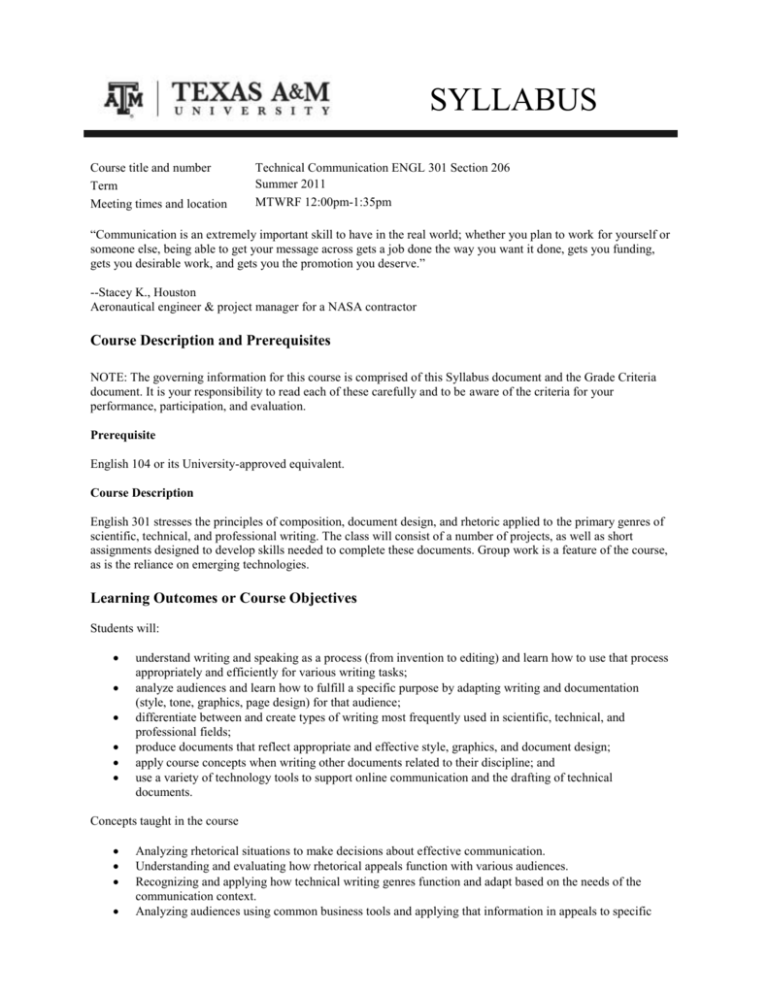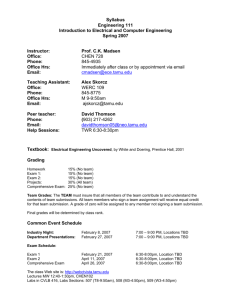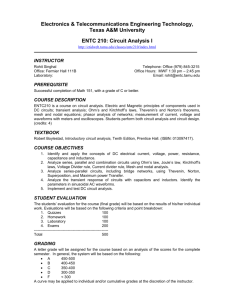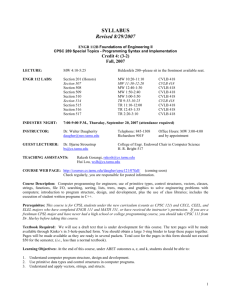
SYLLABUS
Course title and number
Term
Meeting times and location
Technical Communication ENGL 301 Section 206
Summer 2011
MTWRF 12:00pm-1:35pm
“Communication is an extremely important skill to have in the real world; whether you plan to work for yourself or
someone else, being able to get your message across gets a job done the way you want it done, gets you funding,
gets you desirable work, and gets you the promotion you deserve.”
--Stacey K., Houston
Aeronautical engineer & project manager for a NASA contractor
Course Description and Prerequisites
NOTE: The governing information for this course is comprised of this Syllabus document and the Grade Criteria
document. It is your responsibility to read each of these carefully and to be aware of the criteria for your
performance, participation, and evaluation.
Prerequisite
English 104 or its University-approved equivalent.
Course Description
English 301 stresses the principles of composition, document design, and rhetoric applied to the primary genres of
scientific, technical, and professional writing. The class will consist of a number of projects, as well as short
assignments designed to develop skills needed to complete these documents. Group work is a feature of the course,
as is the reliance on emerging technologies.
Learning Outcomes or Course Objectives
Students will:
understand writing and speaking as a process (from invention to editing) and learn how to use that process
appropriately and efficiently for various writing tasks;
analyze audiences and learn how to fulfill a specific purpose by adapting writing and documentation
(style, tone, graphics, page design) for that audience;
differentiate between and create types of writing most frequently used in scientific, technical, and
professional fields;
produce documents that reflect appropriate and effective style, graphics, and document design;
apply course concepts when writing other documents related to their discipline; and
use a variety of technology tools to support online communication and the drafting of technical
documents.
Concepts taught in the course
Analyzing rhetorical situations to make decisions about effective communication.
Understanding and evaluating how rhetorical appeals function with various audiences.
Recognizing and applying how technical writing genres function and adapt based on the needs of the
communication context.
Analyzing audiences using common business tools and applying that information in appeals to specific
audiences.
Designing and interpreting simple primary research (survey, observation, interview) using awareness of
common pitfalls and better practices.
Evaluating secondary resources for credibility and context-appropriate use.
Understanding and applying concepts in visual rhetoric to the tasks of page layout and design and in the
use of persuasive technology.
Creating and integrating graphics appropriately for a specific audience and context.
Practicing editing techniques for clarity, conciseness and precision; compose an analytical text.
Instructor Information
Name
Telephone number
Email address
Office hours
Office location
Adrienne Foreman
(979) 845-3452 ext. 36
aforeman@tamu.edu
Tuesday and Wednesday 1:40pm-2:40pm and by appt.
Blocker 222A
Textbook and/or Resource Material
Johnson-Sheehan, Richard. Technical Communication Today. 3rd ed. New York: Pearson Longman, 2010.
NOTE: You are required to purchase a copy of the course textbook noted above. You will have reading
assignments and quizzes in each lesson. Failure to purchase a textbook and have it available to you at the start of
the term will not exempt you from taking the quizzes. It is also not an acceptable reason for granting an extension
for any work you might miss as a result.
Grading Policies
Your grade is based on the average grade you accumulate by completing the tasks listed below.
NOTE: You must complete all of the assignments per the guidelines in the Course Policies to receive a passing
grade this course (see the "Course Policies for ENGL301" section below for details).
Assignment
Reading Quizzes
Activities
Major Writing Project 1
Major Writing Project 2
Major Writing Project 3
TOTAL
Description
Reading Quizzes
Lesson Activities
Rhetorical Analysis
Job Application Packet
Analytical Report Project
Percentage of Grade
15%
20%
20%
20%
25%
100%
Grading Rationale
The curriculum for this course is "scaffolded,” meaning that the content from each lesson builds on the content
from the previous one. You will be working toward producing three major written assignments that are very
common in the workplace.
Lesson Activities: Each lesson in the course will have at least one activity for you to complete. These activities are
structured to help you learn basic skills to prepare you to successfully complete the three major writing
assignments for the course. Through these activities, you’ll learn important skills like
applying different genres of technical writing for specific purposes,
analyzing rhetorical techniques and appeals that will give your ideas power and influence,
differentiating between stakeholders and decision makers in your audience so you can tailor your ideas to
the most effective audiences,
creating graphics that display critical information in ways that make sense to your readers,
developing presentations that focus on the information that’s most important to your audience, and
mastering software that will enable you to make your information professional and attractive, help you
conduct research, and prepare you for the professional workplace.
Reading Quizzes: You will also have assigned readings from your textbook for each lesson. It is required that you
purchase a copy of the textbook for class. Also, you will have a reading quiz in each lesson. Quizzes may be
administered online through a companion website for your course section. Consult your instructor for details.
Major Writing Assignments: You will have three major writing assignments for the semester:
A Rhetorical Analysis
A Job Application Packet
A Formal Analytical Report Project
The skills you’ve mastered through the Lesson Activities will directly apply to the completion of these projects; in
fact, a few Lesson Activities will account for part of the Projects themselves.
Grading Procedures
Late assignments are generally not accepted without a timely, University-approved excuse.
Grades will be posted in a timely manner.
Per University policy, your instructor cannot discuss grades in email due to security issues and your right
to privacy. If you have a question about your grade, send your instructor a message via Moodle messaging
indicating that you want to discuss your grade, and your instructor will make arrangements with you to
speak with you about it over the phone, or in his or her office.
Your instructor's goal is to help you improve your writing skills, and so it is important for you to ask
questions.
Extra credit assignments or a final grade curve will not be offered in this section.
Instructions for Grade Appeal. If you would like to discuss an assignment grade, you must:
review carefully all instructor responses to your papers (assignments submitted through Turnitin.com will
be returned with a Grademark link includes your instructor's comments),
review all assignment materials pertinent to that assignment,
wait at least 24 hours after assignment grade receipt, and
appeal the grade by writing a detailed response regarding your grade. You will explain how your
assignment fulfills the requirements of the prompt, focusing on the elements that your instructor's
comments state are missing, flawed, or incorrect.
Finally, contact your instructor regarding arrangements for submitting your request. Since it's against
University policy to discuss grades via email, your instructor may require that you send the request
through standard mail or submit it in person.
Grades. Grades are not negotiable. Your final course grade will be based on your work in the course. If you are
concerned about a grade, see me during office hours.
Numerical Grade Equivalents. Course grades are calculated on the standard scale:
A = 100-90
B = 89-80
C = 79-70
D = 69-60
F = 59-0
Completion of All Work. You must complete all work assigned in the course to earn any grade other than an F in
the course.
Grade of "I". You should not assume that you may "take an incomplete" in this course. TAMU Student Rules
provide guidelines for assigning a grade of I. Requests for Incompletes should be addressed to Dr. Jim Baker,
Associate Director of Writing Programs. Your college advising office will be contacted to verify your reason for
requesting a grade of I. Requests will be considered only if you have a grade of C or above, a record of good
attendance prior to illness or emergencies, and only if you have completed 60% of the work in the course.
Moodle
To register for Moodle, go to http://courses-spring.english.tamu.edu/moodle/ and follow these steps. You need to
register before or on the first day of class so you can access the course materials.
1. Bookmark the specific URL given above for easy access throughout the semester.
2. Click on the 301 Sections link
3. Click on Foreman, Adrienne ENGL 301-584
4. Click on Login
5. Enter your NetID name and password.
6. Enter the “enrollment key” provided: The enrollment key for this section is gigem2011a
After this first time, you’ll simply enter your NetID to log in (steps 1-5 above).
Course Topics, Calendar of Activities, Major Assignment Dates
All required readings listed below are from the primary course textbook (Johnson-Sheehan, Richard. Technical
Communication Today. 3rd ed. New York: Pearson Longman, 2010).
Dates
Topic
Required Reading
6th
7th
Course Orientation
Technical Communication in the
Workplace & the Tech Writing Process
Chapter 1
8th
11th
12th
13th
14th
15th
18th
19th
20th
21st
22nd
25th
26th
27th
28th
29th
1st
2nd
3rd
4th-5th
8th
Rhetorical Analysis in Tech Comm
Go Over Rhetorical Analysis Project
Planning, Organizing and Drafting
Chapter 2
Chapter 3
Handout
Chapter 6
Chapter 8, 9
Class Cancelled
Rhetorical Analysis Due
Go over Job Application Packet
Basic Genres of Tech Writing
Resume
Researching and Managing Information
Advanced Genres of Tech Writing I
Job Application Packet Due
Go over Analysis Report
Writing and Revising
Document Design
Graphics
Presentations
Ethics
Wrap Up and Project Work
Presentations
Analysis Report Due
Chapter 13
Chapter 17
Chapter 15
Chapter 7
Chapter 19
Chapter 21
Chapter 23
Chapter 12
Chapter 10
Chapter 11
Chapter 16
Chapter 5
Course Policies for ENGL 301
You are responsible for being familiar with the Writing Program’s policies <http://wwwenglish.tamu.edu/
index.php?id=737 > and with Texas A&M Student Rules <http://student-rules.tamu.edu>. If you have questions,
see your instructor or come to the Writing Programs Office, Blocker 234.
Attendance. It is your responsibility to attend the section in which you are officially registered. Neither purchase
of textbooks nor completion of assignments is a valid reason to continue attending the wrong section. The Writing
Programs Office stands firm on the expectation that students attend class and submit all assignments in the
sequence they are assigned in accordance with the deadlines listed in the course syllabus or announced in class.
Failure to do so will result in a grade of F: See TAMU Student Rule 7.
Authorized Absences. You are responsible for providing evidence to substantiate "authorized absences." If you
know in advance that you will miss a class, you are responsible for informing me. I will take attendance and enter
the number of absences on the final roster. See TAMU Student Rule 7 for an explanation of authorized absences.
Excessive unexcused absences (more than three) will be reported to your college advising. For excessive excused
absences (three weeks or more), I will recommend that you see your academic advising office about the options
outlined in TAMU Student Rule 7.6.
For injury or illness less than three days, you must submit “confirmation of visit to a health care
professional affirming date and time of visit.” (See TAMU Student Rule 7.1.6.2)
For injury or illness of three or more days, you must submit a “medical confirmation note from . . . [your]
medical provider. The Student Health Center or an off-campus medical professional can provide a
medical confirmation note only if medical professionals are involved in the medical care of the student.
The medical confirmation note must contain the date and time of the illness and medical professional’s
confirmation of needed absence.” (See TAMU Student Rule 7.1.6.1)
Late Assignment Policy. The Late Assignment Policy for this course follows the guidelines described in the
University Student Rules, “Section 7. Attendance” (http://student-rules.tamu.edu/rule07). Students with authorized
University absences
The reason for the absence must comply with the definitions for University-excused absences listed in
Student Rule 7.1.
The student must provide the instructor with appropriate documentation for the absence as defined in
Student Rule 7 prior to the absence. Per Student Rule 7.3,
o “In cases where advance notification is not feasible (e.g. accident, or emergency) the student
must provide notification by the end of the second working day after the absence. This
notification should include an explanation of why notice could not be sent prior to the class.”)
o “If needed, the student must provide additional documentation substantiating the reason for the
absence that is satisfactory to the instructor, within one week of the last date of the absence.”
If the absence is excused, the instructor must either provide the student an opportunity to make up any
quiz, exam or other graded activities or provide a satisfactory alternative to be completed within 30
calendar days from the last day of the absence.
Late Assignments due to Unexcused Absences: According to University Student rule 7.4, "The instructor is
under no obligation to provide an opportunity for the student to make up work missed because of an unexcused
absence." Therefore, if you miss an assignment due to an unexcused absence, it is your responsibility to contact
your instructor immediately to request permission to submit late work. In the event that you are granted permission
to do so,
Your assignment will be penalized 10 points for each consecutive day it is late;
Your assignment will become ineligible for submission on the 10th consecutive day after the original
submission deadline.
Group Work. If group work is assigned outside of class, you should meet on University premises. The Sterling
C. Evans Library provides areas for group study. To make group work efficient and productive, all members
should exhibit professional behavior and remain on task—that is, everyone should work on the project at hand.
Classroom Behavior. Disruptive classroom behavior is defined as anything that would interfere with "an
instructor's ability to conduct the class" or "the ability of other students to profit from the instructional program."
TAMU Student Rules explicitly prohibit disruptive behavior. Disruptive behavior includes use of phones for calls,
messages, gaming, pictures, etc. Your phone must be silenced at all times. If you are going to bring your laptop to
class you can only use it for taking notes or research. There will be no messaging, facebooking, tweeting,
blogging, shopping, etc.
Assumptions and or discrimination based on race, creed, national origin, citizenship status, socio-economic status,
religious practices, sex, gender, gender identity, sexual orientation, age, or disability will not be tolerated in this
class in either verbal or written form.
E-mail and Fax. I will not discuss grades on e-mail and, unless otherwise specified, I will not accept assignments
attached to e-mail messages. The English Department will not accept papers or excuses for missing class faxed to
instructors.
Electronic Devices. As a courtesy to your classmates and to me, turn off all electronic devices before class starts.
Americans with Disabilities Act (ADA)
The Americans with Disabilities Act (ADA) is a federal anti-discrimination statute that provides comprehensive
civil rights protection for persons with disabilities. Among other things, this legislation requires that all students
with disabilities be guaranteed a learning environment that provides for reasonable accommodation of their
disabilities. If you believe you have a disability requiring an accommodation, please contact Disability Services, in
Cain Hall, Room B118, or call 845-1637. For additional information visit http://disability.tamu.edu
Academic Integrity
Aggie Honor Code. "An Aggie does not lie, cheat, or steal, or tolerate those who do.” It is your responsibility to
know the Aggie Honor Code and to understand what constitutes scholastic dishonesty and to avoid it all costs.
Anything (quizzes, participation, and exams) that appears to be a violation of the Aggie Honor Code will be
reported to the Aggie Honor System Office. For additional information please visit:
http://www.tamu.edu/aggiehonor.
Appropriate Attribution. Any assignment that includes sources but fails to include clear and appropriate
attribution of those sources will receive a grade of zero (“0”). Any paper that shows evidence of assistance and
fails to acknowledge that assistance will be considered a violation of the Aggie Honor Code and will be reported as
a case of scholastic dishonesty.
Recycled Papers (also known as multiple submissions in the Aggie Honor Code). If you have taken this course
before and already completed assignments or if you have taken any similar course and completed assignments, you
may not turn in assignments turned in for other courses or in other sections of this same course for credit in this
section of web-based 301. Use of recycled papers from another section of this course or from another course will
be reported to the Aggie Honor System Office and appropriate penalties will apply.
Use of Copyrighted Materials: Courseware, Handouts, and Resources. The course software, learning activities,
and downloadable resources used in this course are copyrighted. This refers to all course materials generated for
this class, which include but are not limited to course videos, courseware interfaces, quizzes, syllabi, learning
activities, sample papers, and custom graphics. Because these materials are copyrighted, it is illegal for you to copy
or redistribute any of this information without the expressed written consent of the author.







